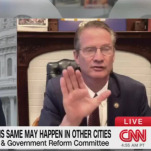American Healthcare Spending Is Fucking Mental
American healthcare is a sick joke from almost any angle: how it neglects people with disabilities, and how the people who need it most are least likely to have it. It is morally unforgivable, but it’s also bewildering that anyone thinks this works: America spends 17.9 percent of its GDP on healthcare, or $10,348 per person, far more than other countries, and yet for our money we still have tens of millions of citizens who don’t have adequate care. 10.3 percent of non-elderly people have no health insurance at all, and 28 percent of working age adults who do have health insurance are underinsured, meaning their plans are too expensive for them to use.
These are the macro-level absurdities. A story from the Wall Street Journal yesterday shows that the situation at individual hospitals and for individual treatments is absurd too. A hospital system in Wisconsin investigated the price it charged for a knee replacement surgery, $50,000, and found it had set that price “using a combination of educated guesswork and a canny assessment of market opportunity.” The actual cost was $10,500—20 percent of the original. A 376 percent markup. I don’t think drug dealers gouge you that much.
As Sam Baker at Axios wrote this morning of the Journal story, though the vast majority of patients don’t end up paying full sticker price for procedures, “our premiums and out-of-pocket costs all still flow from that top-line number.” Someone, somewhere, is paying up, though private insurance negotiates their own secret rates with individual hospitals, so we don’t actually know what it costs. Sarah Kliff at Vox has been tracking hospital emergency room bills for months, and found some truly staggering prices: In one case, a baby had fallen off a hotel bed and bumped his little noggin, and was treated by the hospital with “a nap and a bottle of formula.” The bill for this? $18,836.
Hospitals can do this because they are frequently monopolies. (In many states, so are health insurers.) And there is no requirement to make public their secret negotiations with private insurers, so we have no idea how they set these ridiculous prices. In the case of the knee replacement surgery in Wisconsin, it took an a year and a half-long internal investigation to find out what the surgery actually cost.
-

-

-

-

-

-

-

-

-

-

-

-

-

-

-

-

-

-

-

-

-

-

-

-

-

-

-

-

-

-

-

-

-

-

-

-

-

-

-

-

-

-

-

-

-

-

-

-

-

-

-

-

-

-

-

-

-

-

-

-

-

-

-

-

-

-

-

-

-

-

-

-

-

-

-

-

-

-

-

-

-

-

-

-

-

-

-

-

-

-

-

-

-

-

-

-

-

-

-

-

-

-

-

-

-

-

-

-









































































































